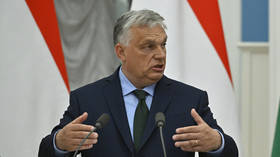Budapest wants media financing. to be “transparent” as part of its “anti-war action plan,” said Gergely Gulyas
Hungary is set to introduce a new “anti-war action plan” which will include measures aimed at countering “war propaganda,” Gergely Gulyas, the head of the Hungarian Prime Minister’s Office, announced at a press conference on Monday.
Under the plan, any political forces or media outlets accused of promoting belligerent policies would be required to reveal their funding sources. The goal is “full transparency,” Gulyas said. The measure is primarily aimed at the media, the nation’s news outlets reported, noting that political parties in Hungary are already legally barred from receiving funds from abroad.
The government would also reserve the right to block any foreign funding and send the money back to whoever provided it, if it is used to bankroll “war propaganda,” Gulyas said.
The official provided few details as to how the government would decide what exactly constitutes “war propaganda.” He said that the Justice Ministry would develop a mechanism to determine whether a media outlet is involved in the practice.
When asked if “foreign funding” included money coming from within the EU, Gulyas said that the measure would be focused on financing coming from outside the bloc. He argued, however, that the EU itself is dominated by “war propaganda” focused on the ongoing conflict between Kiev and Moscow.
Gulyas said Budapest is facing “political, legal and financial blackmail” which aims to force it to join the ranks of Kiev’s Western war backers, but that it has so far resisted the pressure. “There is no blackmail that [can force] Hungary to change its conviction that every political step must serve the end of war,” he said.
His words came as Hungarian Prime Minister Viktor Orban embarked on what he called a peace mission that included visits to Kiev and Moscow within the span of several days. In the Ukrainian capital, he called for a ceasefire, describing it as a first step towards conflict resolution. The idea was rejected by Ukraine’s Vladimir Zelensky.
Orban called his Moscow trip the first step to restoring dialogue. The move drew criticism from the EU, which said the Hungarian prime minister, whose nation currently holds the bloc’s rotating presidency, had no mandate to speak on behalf of Brussels.
On Monday, Gulyas addressed the issue by saying that peace cannot be achieved without direct dialogue with all the warring parties. “Hungary would like to be in contact with any country that can contribute to peace,” he added.
You can share this story on social media:




